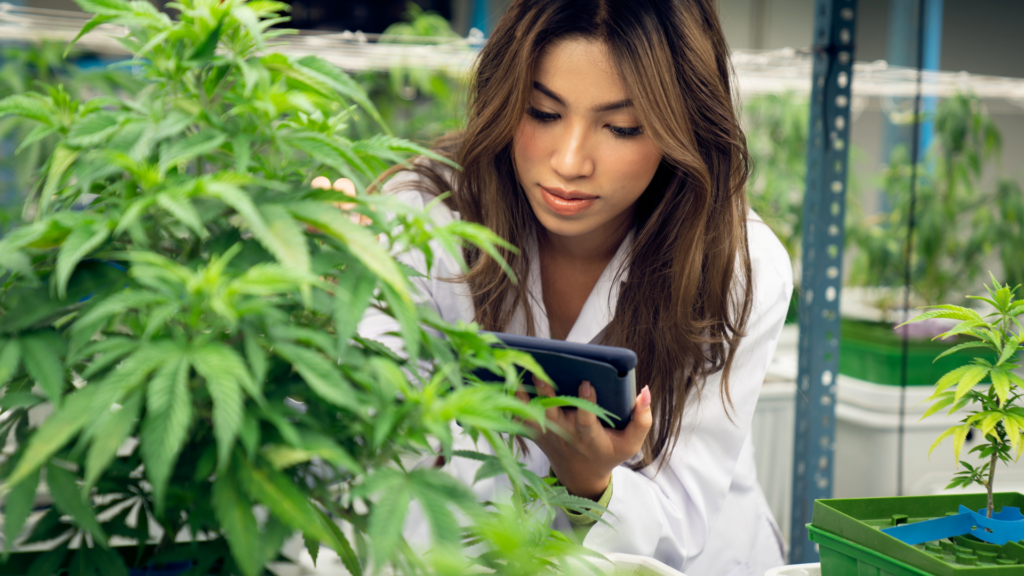In order to understand the best process for growing organic cannabis, we need to understand that the word, organic is often misunderstood in the cannabis industry. This term carries significant weight in various agricultural sectors, and its correct application and understanding are crucial for consumers and producers alike. Here, we’ll delve into the definition of “organic,” common misunderstandings surrounding organic cannabis, and the implications for the industry. We’ll also highlight the importance of standard operating procedures and employee training in ensuring the integrity of organic cannabis production.

Definition of “Organic”
Organic refers to a method of farming and production that prioritizes natural processes and sustainability, avoiding the use of synthetic chemicals and genetically modified organisms (GMOs). Here’s a more detailed breakdown:
- Agricultural Practices:
- Soil Health: Organic farming focuses on maintaining and improving soil fertility through natural methods such as crop rotation, green manure, composting, and biological pest control.
- Pest Management: Instead of synthetic pesticides, organic farming relies on natural predators, biopesticides, and mechanical controls to manage pests and diseases.
- Fertilization: Organic farms use natural fertilizers like compost, animal manure, and other organic materials to nourish plants.
- Animal Husbandry:
- Diet: Animals are fed organic, non-GMO feed.
- Living Conditions: Livestock is provided with access to the outdoors and is raised in conditions that promote natural behaviors.
- Health Management: Organic farming avoids the routine use of antibiotics and hormones, relying on preventive health practices and natural remedies.
- Processing and Handling:
- Ingredients: Organic products are made using organically grown ingredients and avoid artificial additives and preservatives.
- Certification: In many regions, products labeled as organic must be certified by recognized organizations. For example, in the U.S., the USDA Organic certification ensures compliance with specific organic standards.
- Environmental Impact:
- Sustainability: Organic farming practices aim to be environmentally sustainable, reducing pollution, conserving water, and promoting biodiversity.
The Process for Growing Organic Cannabis
The process for growing organic cannabis mirrors the principles of organic farming but adapts them to the specific needs and challenges of cannabis cultivation. Here are key steps involved:
- Soil Preparation and Health:
- Start with rich, organic soil, incorporating compost and other organic matter to enhance soil structure and fertility.
- Employ crop rotation and cover crops to prevent soil depletion and erosion.
- Seed Selection and Germination:
- Choose high-quality, non-GMO cannabis seeds.
- Germinate seeds in an organic medium to ensure a strong start for the plants.
- Planting and Growth:
- Transplant seedlings into well-prepared organic soil.
- Use organic mulch to retain soil moisture and suppress weeds.
- Nutrient Management:
- Feed plants with organic fertilizers such as compost tea, fish emulsion, and seaweed extracts.
- Monitor soil pH and nutrient levels to maintain optimal growing conditions.
- Pest and Disease Control:
- Employ integrated pest management (IPM) techniques, using beneficial insects and organic biopesticides.
- Regularly inspect plants for signs of pests and diseases, and address issues promptly with organic solutions.
- Harvesting and Processing:
- Harvest cannabis at peak potency, handling plants gently to avoid damage.
- Dry and cure cannabis in a controlled environment to preserve quality and potency.
- Ensure all processing and packaging materials are organic and free from synthetic additives.
Common Misunderstandings
- Regulation and Standards: Many consumers assume that “organic” cannabis is held to the same regulatory standards as organic food products. However, the cannabis industry lacks uniform federal regulations, particularly in the United States, leading to varying definitions and standards across states and countries.
- Pesticides and Chemicals: People often believe that “organic” means completely free of pesticides and chemicals. While organic farming minimizes the use of synthetic chemicals, organic cannabis can still use certain natural pesticides and fertilizers.
- Certification: There is confusion about what constitutes an “organic” certification. Since cannabis is federally illegal in the U.S., it cannot be certified organic under the USDA. However, third-party organizations may offer their own certification, leading to inconsistency and confusion among consumers.
- Environmental Impact: Some assume that “organic” cannabis is always environmentally friendly. While organic farming practices can be more sustainable, they are not inherently so. The environmental impact depends on various factors, including water usage, energy consumption, and overall farming practices.
Implications for the Cannabis Industry
- Consumer Trust: Misunderstandings about what “organic” means can erode consumer trust when the product does not meet their expectations.
- Market Claims: Producers might label their products as “organic” without adhering to rigorous standards, leveraging the term as a marketing strategy.
- Education: There is a significant need for consumer education to understand what organic practices entail and how they are applied to cannabis cultivation.
The Importance of Standard Operating Procedures and Employee Training
To ensure the integrity of organic cannabis production, it is vital to implement comprehensive standard operating procedures (SOPs) and provide thorough employee training. SOPs ensure consistency, quality, and compliance with organic standards, while employee training empowers workers with the knowledge and skills to carry out organic farming practices effectively. Investing in these areas helps build consumer trust, enhances product quality, and supports sustainable cultivation practices.
For those in the cannabis industry, adopting rigorous SOPs and prioritizing employee training is crucial for successfully growing and marketing organic cannabis. By doing so, producers can meet consumer expectations, adhere to ethical farming practices, and contribute to a more transparent and trustworthy market.
Explore our resources and training programs to enhance your organic cannabis cultivation practices and stay ahead in the industry. 🌿
By focusing on these aspects, cannabis producers can better navigate the complexities of organic cultivation and deliver products that truly meet the standards and expectations associated with the term “organic.”





